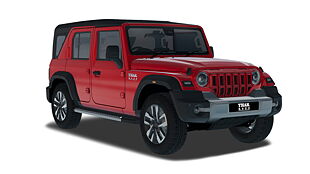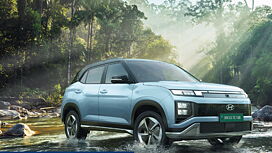Introduction

The key difference between the two cars you see in the images is their difference in size. The Mahindra TUV 300 is a size bigger than the Ford EcoSport in every aspect, be it dimensions, cabin space or number of seats. They come from different school of thought too. Where our Desi Mahindra TUV is built on a rugged ladder frame, the Ford EcoSport is underpinned by a more car-like monocoque chassis. But what brings them together in the same ring are two common factors – both are SUVs and they fall in a similar price bracket.
Ford has given the already impressive EcoSport a mild upgrade and is a better all-round package than the old car. It retains its core strength like robust build, accomplished dynamics and strong performance. The macho TUV on the other hand looks a size bigger than the Ford. Thanks to its high seating and wide cabin it gives you a proper SUV experience. The fact that it gets seven seats, tilts the battle further in its favor. So what will we choose? Size or substance? Ruggedness or ease of use? Read-on to find out.

Internal affairs


Apart from some new chrome bits and extra equipment, the EcoSport’s cabin looks the same as the old car. So you get a modern cabin which is packed with loads of features. Although the EcoSport is not that great in terms of quality and finish, it still feels more consistent than the Mahindra. The TUV gets a decently finished cabin too but the small dashboard and near vertical windscreen makes the cabin look a bit crude in comparison. Also, as the Ford sits lower than the Mahindra, it’s the easier SUV to get into and out of. On the flipside, you don’t get as commanding a view of the road as you would from the TUV 300’s elevated driver’s seat. Both SUVs offer good front seat comfort but again it’s the EcoSport’s better bolstered seat that will hold you better.


Though the Ford can’t match the TUV for rear legroom, it’s spacious enough in its own right. What works in Ford’s favour further is the seat itself which offers more thigh support and better overall comfort than the Mahindra’s middle row. However, the equation changes when you need to seat three in the back, which is when your passengers will appreciate the TUV’s wider cabin and flat floor. Also the TUV’s airy cabin gives it better ambience as compared to the claustrophobic all-black cabin of the Ford.


This leads us to the Mahindra’s big advantage, of carrying two extra passengers. While the ability to carry seven makes the TUV ideal for buyers with large families, you should know that the two jump seats at the back are short on space and comfort. They don’t seem too safe in case of rear collision either, as you sit very close to the rear door with no seatbelts.

In terms of equipment the Ford offers a lot more equipment than the Mahindra. It gets features like the SYNC system which houses voice commands, Emergency Assistance and App-link (it recognises some of your phone apps). It also gets automatic climate control and the top Titanium + variant also comes with six airbags. You can argue that the EcoSport is much more expensive, but even the lower Titanium variant gets more equipment than the TUV 300.

Power struggles

Displacing 1498cc, the 99bhp EcoSport engine is as big as the one on the TUV. But where the Ford has four cylinders, the Mahindra makes do with just three. Thanks to the lighter body and strong engine, the front-wheel-drive Ford is significantly faster than the TUV in flat-out performance. It registered a time of 13.3seconds to 100kmph which makes it nearly six seconds quicker than the TUV. Thanks to the updates the 1.5-litre motor has less lag than before and it delivers power in a linear manner.

Performance numbers aside, the rear-wheel-drive TUV actually feels very nice to drive, especially in town. Power delivery is even smoother than the EcoSport and in city traffic there is ample pulling power, which is available from as low as 1200rpm. This, along with the broad spread of power and shorter gear ratios, makes the engine very flexible. This also means, in the all-important drivability test the TUV actually fares better. Be it 20-80kmph in third or 40-100kmph in fourth the 84bhp motor of the TUV 300 is much quicker than the lighter EcoSport. As a result, you also have to make fewer gear changes, which is a good thing, because the Mahindra gearbox is quite notchy to use. Unlike the TUV, the Ford feels a bit weak at lower revs but still has sufficient power for everyday driving conditions. The engine tends to get bogged down on uphill roads so you need to keep shuffling between third and second gears to maintain momentum. But as the going gets faster the TUV really struggles and past 3200rpm the power tails off. As a result overtaking on the highway needs careful planning and this is where the EcoSport has the edge.

Ease of operation

Good ride and handling balance has been one of the key strengths of the EcoSport. Since the suspension and mechanical bits have been carried over on the updated car, it doesn’t disappoint behind the wheel. The Ford’s suspension setting is on the stiffer side. This means it has tight body movements and combined with the low centre of gravity and sorted mechanical underpinnings it can be driven hard around corners and there are very few occasions when the EcoSport feels like an SUV.

On the flip side, the EcoSport crashes through ruts and potholes while driving over bad roads at low speeds. However, as speeds increases the ride quality improves considerably and it easily trumps over the worst of our roads. Unlike the Ford, the TUV has a soft suspension setting. This coupled with the hefty bulk, tall design and wide dimensions makes it a rather sloppy handler. When driven hard, the tyres start squealing early and there is plenty of body roll while negotiating bends. The steering is overtly light and it never feels as composed or surefooted as the EcoSport. At low speeds, the ride quality is good and the suspension quietly absorbs the impact while navigating over uneven surfaces and pothole-filled roads. The higher profile tyres also do their bit in damping sharp bumps and road undulations from jarring the cabin. At higher speeds the ride quality never feels completely settled and there is loads of up and down movement while driving over road undulations.

How much will you spend?

On the pricing front the EcoSport is substantially more expensive than the TUV 300 especially in the Titanium + trim. But here we have considered the lower Titanium variant as it still has more standard features than the Mahindra. Priced at Rs 9.8 lakh, the EcoSport even in this spec is more than a lakh expensive than the top TUV T8 variant.

But the EcoSport pulls things back by being much more efficient than the TUV. In the city, the Ford returned an impressive 13.8kmpl while on the highway it gave 18.8kmpl. The TUV in comparison, gave a modest 11.9kmpl in the city and 17kmpl on the highway. This is mainly down to the 300kg plus weight penalty the Mahindra carries.
Verdict

Mahindra TUV300 T8
Price – Rs 8.48 lakh
Rank – 2nd
Final Score – 348/600
The TUV is a full-sized SUV which offers great value for money. It is by far the cheaper of the two, is powered by a refined motor, has a big spacious cabin and it also gives you a proper SUV experience. But it suffers because of the mediocre highway performance and the ride and handling package leaves a lot to be desired.

Ford EcoSport TDCI Titanium
Price – Rs 9.86 lakh
Rank – 1st
Final Score – 364/600
The EcoSport isn’t a value proposition considering its expensive price tag. So is it a better car than the TUV? We think it is. The Ford has car-like road manners and the strong engine just adds to its fun to drive character. The build quality is decent too and the much better fuel efficiency just distances the EcoSport from the much bigger TUV. The EcoSport is our clear winner here.

Specification
| CAR NAME | Mahindra TUV 300 | Ford EcoSport |
| Variant | m_HAWK T8 | TDCI Titanium |
| ENGINE | ||
| Fuel | Diesel | Diesel |
| Installation | Front, longitudinal | Front, transverse |
| Displacement | 3 cyls, 1493cc | 4 cyls, 1498cc |
| Bore/stroke | 83.0/92.0mm | 73.5/88.3mm |
| Valve gear | 4 valves per cyl DOHC | 2 valves per cyl SOHC |
| Power | 84bhp at 3750rpm | 99bhp at 3750rpm |
| Torque | 230Nm at 1500rpm | 205Nm at 1750rpm |
| Power to weight | 50.9bhp per tonne | 76.74bhp per tonne |
| Torque to weight | 139.39Nm per tonne | 158.91Nm per tonne |
| Gearbox | 5-speed manual | 5-speed manual |
| CHASSIS & BODY | ||
| Kerb weight | 1650kg | 1290kg |
| Tyres | 215/75 R15 | 205/60 R16 |
| Spare | Full-size | Full-size |
| STEERING | ||
| Type | Rack and pinion | Rack and pinion |
| Type of assist | Hydraulic | Electric |
| Turning circle | 10.7m | 10.6m |
| BRAKES | ||
| Front | Discs | Discs |
| Rear | Drums | Drums |
| Anti-lock | Yes | Yes |
Test Data
| CAR NAME | Mahindra TUV300 | Ford EcoSport |
| Variant | m_HAWK | TDCI Titanium |
| PERFORMANCE & BRAKING | ||
| 0-20kmph | 1.50s | 1.04s |
| 0-40kmph | 3.71s | 2.65s |
| 0-60kmph | 7.04s | 5.18s |
| 0-80kmph | 11.83s | 8.64s |
| 0-100kmph | 19.05s | 13.36s |
| 0-120kmph | 32.00s | 21.06s |
| 20-80kmph in 3rd gear | 11.29s | 13.31s |
| 40-100kmph in 4th gear | 15.29s | 16.29s |
| 80-0kmph | 29.29m | 26.52m |
| FUEL ECONOMY | ||
| City | 11.9kmpl | 13.8kmpl |
| Highway | 17kmpl | 18.8kmpl |
| Tank size | 45 litres | 52 litres |
| Range | 560km | 725km |
| INTERIOR MEASUREMENTS | ||
| Front | ||
| Legroom(Max/min) | 800/640mm | 850/620mm |
| Headroom(Max/min) | 1040mm | 980mm |
| Shoulder room | 1460mm | 1400mm |
| Backrest height | 600mm | 590mm |
| Rear | ||
| Legroom(Max/min) | 870/660mm | 870/630mm |
| Ideal legroom | 740mm | 710mm |
| Headroom | 990mm | 950mm |
| Shoulder room | 1460mm | 1310mm |
| Seat base length | 530mm | 490mm |
| Backrest height | 600mm | 570mm |
| Boot | 384litres | 346litres |
| Length/width/height | 600/1130/690mm | 700/1000/600mm |
| Loading lip height | 800mm | 660mm |
Score sheet
| Parameters | Max points | Mahindra TUV300 |
Ford EcoSport |
| DRIVING FEEL | |||
| Steering response | 20 | 9 | 12 |
| Directional stability | 25 | 13 | 16 |
| Engine characteristics | 25 | 15 | 16 |
| Gearbox | 20 | 9 | 12 |
| Visibility | 10 | 7 | 6 |
| Intermediate results | 100 | 53 | 62 |
| SPACE | |||
| Front Space | 25 | 18 | 16 |
| Rear space | 25 | 17 | 13 |
| Feeling of space | 20 | 13 | 12 |
| Boot space/flexibility | 20 | 13 | 8 |
| Payload | 10 | 7 | 6 |
| Intermediate results | 100 | 68 | 55 |
| IN THE CABIN | |||
| Comfort equipment | 25 | 10 | 12 |
| Operatibility | 15 | 10 | 10 |
| Feel of quality | 20 | 11 | 12 |
| Front seats/ingress | 20 | 15 | 17 |
| Rear seat/ingress | 20 | 13 | 14 |
| Intermediate results | 100 | 59 | 65 |
| PERFORMANCE | |||
| Acceleration | 25 | 10 | 15 |
| Top speed | 10 | 6 | 6 |
| Driveability | 30 | 23 | 20 |
| Braking | 25 | 19 | 20 |
| Environment | 10 | 6 | 6 |
| Intermediate results | 100 | 64 | 67 |
| ROAD MANNERS | |||
| Ride quality | 30 | 18 | 20 |
| Turning circle | 15 | 12 | 13 |
| Handling | 20 | 9 | 12 |
| Manoeuvrability | 15 | 9 | 10 |
| Safety | 20 | 3 | 7 |
| Intermediate results | 100 | 51 | 62 |
| PRICE | |||
| Price | 45 | 21 | 18 |
| Resale | 10 | 6 | 6 |
| Warranty | 10 | 7 | 7 |
| Fuel efficiency | 35 | 19 | 22 |
| Intermediate results | 100 | 53 | 53 |
| Total | 600 | 348 | 364 |

![फ़ोर्ड ईकोस्पोर्ट [2015-2017] इमेज फ़ोर्ड ईकोस्पोर्ट [2015-2017] इमेज](https://imgd.aeplcdn.com/272x153/cw/ec/20482/Ford-EcoSport-Right-Front-Three-Quarter-77975.jpg?wm=0&q=80)





















